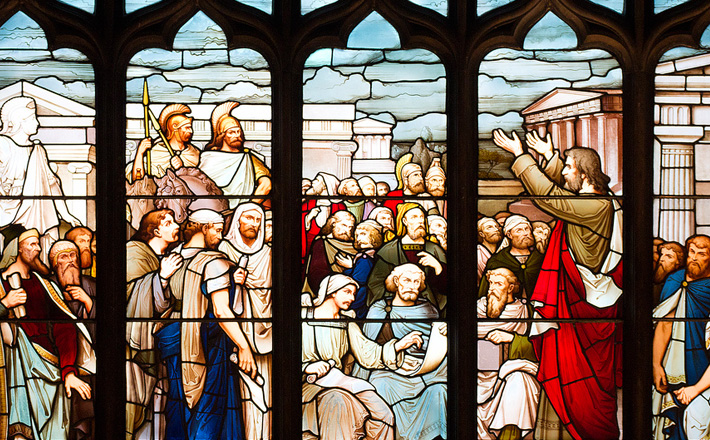Commentary on Acts 17:22-31
Paul was the chosen instrument to carry Christ’s name to the Gentiles (Acts 9:15).
Yet only twice in Acts is Paul’s missionary preaching aimed at an exclusively Gentile audience: in Paul’s address to the residents at Lystra (Acts 14:15-17) and in Paul’s Areopagus speech delivered in Athens (17:22-31).
To understand the rhetorical and cultural strategies of Paul’s Areopagus speech, we must take into account the passing note made by Luke in Acts 17:21: “Now, all the Athenians and the foreigners living among them spent their time in nothing other than (trying) either to say or to hear something novel.” Despite the Athenians’ insatiable appetite for “new things” (well known in antiquity: Demosthenes, Oration 4:10; Aristophanes, Eq. 1260-63), Paul demonstrates that the true identity of the “unknown God” is anything but new.
The Areopagus sermon is the fullest and most dramatic speech of Paul’s missionary career. Anticipated by the shorter address in Lystra (14:15-17) and consistent with the kerygma Paul presents to the Gentiles in his letters (cf. Romans 1-3; 1 Thessalonians 1), this address provides a window into how Paul dealt with the Gentiles in other places. The speech may be outlined as follows:
A: Introduction — Evidence of the ignorance of pagan worship (17:22-23)
B: The object of true worship is the one Creator God (17:24-25)
C: Proper relationship between humanity and God (17:26-28)
B´: The object of false worship are the idols of gold, silver, or stone (17:29)
A´: Conclusion — The time of ignorance is now over (17:30-31)
The sermon begins with Paul’s attempt to curry the favor of his audience with a compliment: “Athenians! I see that you are very religious in every way” (17:22b). His evidence for their religiosity is taken from his tour of the city: “For as I walked around and carefully observed your objects of worship, I even discovered an altar upon which had been inscribed, ‘To an unknown god’” (17:23a). Paul uses the inscription as a point of departure for the remainder of his speech; within the compliment is an implicit criticism: “that which you worship in ignorance, this is what I am proclaiming to you” (17:23b). The Athenians had been worshipping an object, not a personal God, a “what,” not a “whom.”
Paul then claims that this unknown God is none other than the Creator God(17:24-25). The concept of a creator deity was not unknown to the Greeks (see Epictetus, Diatr. 4.7.6), but there is no other god worthy of worship; indeed, ultimately Paul would argue there is no other God. Though Paul does not quote Scripture, his monotheism is biblically grounded (cf. 1 Kings 8:27; 2 Chronicles 6:18; Isa 42:5).
This emphasis on God the creator (who is separate from the created order) also echoes earlier speeches in Acts: 4:24; 7:48-50; 14:15. The statement that God has “need of nothing” echoes both Jewish (“the Deity stands in need of nothing”; Josephus, Ant. 8.4.3.111) and pagan philosophical (“God has need of nothing”; Euripides, Herc. fur.1345-46) views of God’s self-sufficiency. Furthermore, that such a God is not to be worshipped in human-made temples also resonates both with Jewish (Isa 57:15; Josephus, Ant. 8.3.2.114) and pagan (Lucian of Samosata, Sacr. 11) traditions. The argument here also specifically echoes some Stoic teaching, e.g., “It is Zeno’s teaching that one should not build temples of the gods” (Plutarch, Mor. 1034B), although as we shall see, however much Paul wishes to identify with his audience, in the end, he proclaims a distinctively Christian message.
Paul then speaks of God’s creative act of humanity: “From a single person he made every race of people”(17:26). Despite possible connections to the Platonic notion of the “one” and the ‘many” (Pato, Resp. 596a), Paul is not echoing the Platonic, philosophical “one,” but rather the “one man” Adam from whom the human race descended (Genesis 2:7; see Luke 3:23-28 and 17:31 below).
This same God also “established orderly seasons and boundaries.” Once again, this claim resonates with a Greco-Roman understanding (Cicero, Tusc. 1.28.68-69), but it also is grounded in Jewish understanding of God’s creative work in separating “space and time in orderly fashion” (Genesis 1:24; Deuteronomy 32:8; Psalm 73:17; Wisdom 7:17-19). Humanity is created “to live” within this cosmos and “to seek God.” “Seeking God” is a biblical theme (Isa 51:1; Psalms 26:8; 104:4; Proverbs 16:15; 28:5; Sirach 2:15).
The next phrase expands on the nature of our seeking: “If only they might really search hard for him and find (the one)” (17:27). That God is “not far from any one of us” is, however, a cause for hope. In fact, the book of Acts, with its various epiphanies of God’s voice, Spirit, angel, and Anointed One (Acts 2; 9; 10-11; 12; 13; 16; etc.), confirms Paul’s claim of God’s immanence. But does the experience of the divine come through human fumbling and groping after it or is it God who enables our apprehension of his presence?
In anticipation of such a question, Paul claims: “For in him we live and move and exist” (17:28). The triad of live, move, and exist underscores the fact that our very existence depends utterly and absolutely on God. In God, we live, move (search?!), and exist. Paul’s “natural theology” is grounded in the enabling presence of God.
Paul’s argument then pivots, not on an Old Testament quotation, but rather a citation from one“of your own poets”:“For we too are his offspring” (17:28b). The quotation is presumably from the Stoic philosopher Aratus (Phaen. 5; cf. Clement of Alexander, Strom. 1.19.91). Nonetheless, the underlying sense of the quotation has a biblical grounding, picking up the allusion above to the “one” Adam, the “son of God” (cf. Luke 3:38). That is, we are God’s offspring, created in God’s image (cf. Genesis 1:26).
Building on his last statement, Paul contrasts the object of true worship (17:24-25) with an account of the false worship of idols (17:29). Here then is the basis for Paul’s attack on idolatry which follows: “we are God’s offspring”; thus, humans are the true image of God. Therefore no image made “by a person’s skill and creativity” could possibly be anything other than a distortion of the image of the one, true God (17:29). The condemnation of idolatry is standard in Jewish polemic (Deuteronomy 4:28; Psalms 113:12; 134:25; Isaiah 40:18; 44:9-20; Wisdom 13:5, 10; 15:16-17; cf. Acts 7:41-43), but is not altogether missing in pagan philosophy (Dio Chrysostom, Dei cogn.80-83).
Paul ends his sermon by announcing that the time of ignorance is over and calling for eschatological repentance (17:30-31). Now Paul’s purpose is clear. He is not seeking to add a new god to the Athenian Pantheon; he is rather seeking the Athenians’ repentance! God will no longer “overlook” this ignorance (cf. 14:16; Romans 3:25); now is the time for repentance (17:30).
Just as God had made all the nations to inhabit the whole earth from one man (17:26), so God will judge the world through the one man whom God appointed (cf. Romans 5). That this man is Jesus is confirmed when Paul says that God raised him the dead (17:31). Paul has deferred the misunderstood subject of resurrection (17:18) until the end of his speech. The sermon ends with God as the main actor: God overlooks, commands, sets the day, judges the world and provides proof through the resurrection.
Paul’s Areopagus speech is sometimes unfairly criticized: 1) for lacking explicit citations to Scripture, which led 2) to the speech’s failure to win converts among the Athenians. But as we have seen, Paul’s argument is thoroughly grounded in the thought world of biblical Judaism (and Christianity) despite its lack of scriptural citations. And a peek at the very end of the story suggests that while some of Paul’s audience did mock him (17:32a), others promised to hear him again (17:32b), and still others “joined him and believed” (17:34). So goes the proclamation of the Gospel!
Material adapted from The Acts of the Apostles. Paideia Commentary Series. Eds. Mikeal C. Parsons and Charles H. Talbert. Grand Rapids: Baker Academic (a division of Baker Publishing Group), 2008. Used by permission.


May 25, 2014